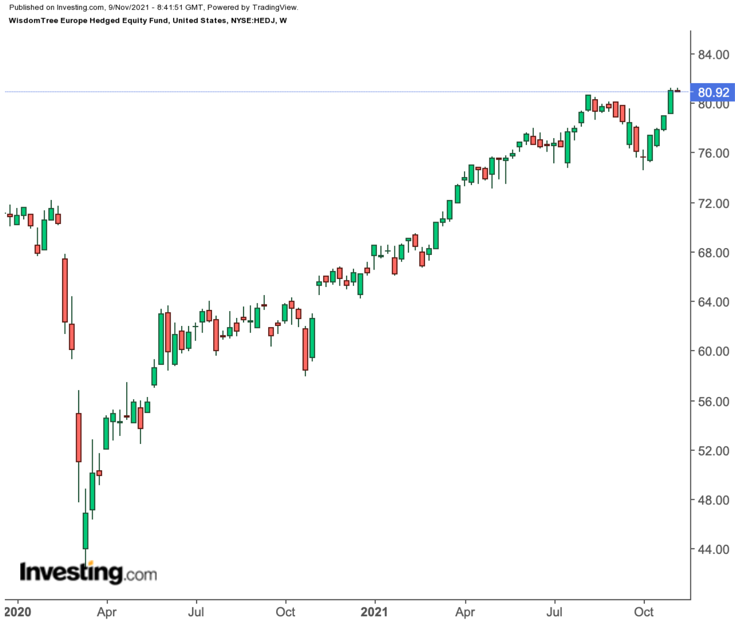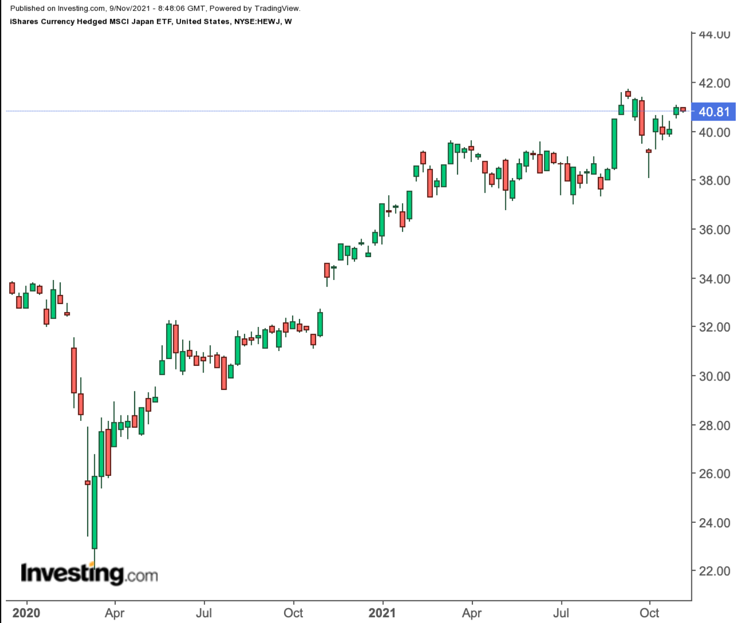Investing in international equities offers exposure to the potential growth of various global industries while boosting portfolio diversification. And exchange-traded funds (ETFs) focusing on a wide range of global stocks enable investors to take advantage of global trends without having to find individual companies.
However, investing in foreign equities exposes investors to moves in foreign exchange rates, affecting investment returns. Put another way, investors have two positions: one in the international asset and another one in the currency.
For instance, let us assume a US resident buys an ETF that holds assets denominated in a foreign currency. If the US dollar appreciates against that currency, the strong dollar would create a risk on the total return of the fund.
Currency moves can be hard to predict. Therefore, many investors prefer fully hedged ETFs to mitigate the foreign exchange (forex) exposure. Such a hedged fund means the foreign currency position and return is taken out of the equation.
Research led by Corey A. Shank of the University of Texas Rio Grande Valley, Edinburg, TX, highlights:
"Traditionally, ETFs look to replicate a targeted index. Currency hedged ETFs have an additional feature besides holding the underlying assets, which is the use of derivatives such as forwards to hedge against future changes in exchange rates. This allows investors who want to own a foreign asset but are worried about exchange rates to hold a fund that is hedged against exchange rates."
Therefore, today we discuss two ETFs appropriate for investors looking to minimize the risks associated with exchange rate fluctuations when they invest in foreign equities. These funds typically use non-standardized, over-the-counter (OTC) derivatives to hedge against price fluctuations in foreign currencies.
1. WisdomTree Europe Hedged Equity Fund
- Current Price: $80.92
- 52-Week Range: $64.18 - $81.26
- Dividend Yield: 1.96%
- Expense Ratio: 0.58% per year
The WisdomTree Europe Hedged Equity Fund (NYSE:HEDJ) seeks to provide exposure to European equities while hedging exposure to fluctuations between the US dollar and the euro. The fund focuses on dividend paying firms that are also exporters.
HEDJ, which has 104 holdings, tracks the returns of the WisdomTree Europe Hedged Equity Index. The fund started trading in December 2009, and has around $2.18 billion in assets. The portfolio is rebalanced annually, but hedges are reset monthly.
In terms of the sub-sectoral breakdown, the Materials sector comprises the largest slice with 18.86%, followed by the Industrials and Consumer Staples with 17.95% and 14.87%, respectively.
Over a quarter of the stocks come from France. Next in line are those from Germany (24.76%), the Netherlands (20.26%), Spain (9.26%) and others. The top 10 holdings account for over 35% of the fund.
UK-headquartered industrial gas and engineering group Linde (NYSE:LIN); Dutch manufacturer of chip-making equipment ASML (NASDAQ:ASML); Spanish financial services group Banco Bilbao Vizcaya Argentaria (NYSE:BBVA), French luxury products brand LVMH Moet Hennessy Louis Vuitton (OTC:LVMUY) and cosmetic products supplier L’Oreal (OTC:LRLCY) lead the names in the ETF.
Over the past year, the fund is up 29.4% and also returned 22.3% year-to-date. Recently, the fund hit an all-time high (ATH). Those investors who are bullish on Europe could consider buying at around $77 or below, which would offer a better margin of safety.
2. iShares Currency Hedged MSCI Japan ETF
- Current Price: $40.81
- 52-Week Range: $33.62 - $41.74
- Dividend Yield: 1.01%
- Expense Ratio: 0.51% per year
From Europe, we move to Japan, which held general elections in late October. Prime Minister (PM) Fumio Kishida declared victory as the Conservative LDP party, along with coalition partner Komeito, retained control of parliament. In recent days PM Kishida let the country know that he will introduce a large stimulus bill.
It is too soon to know how Japanese equities will fare in the months ahead. Yet analysts suggest:
“His challenge will be to balance domestic economic reform with a foreign policy agenda for increased geopolitical influence in the Indo-Pacific as he aims to achieve the twin goals of peace and prosperity.”
Those investors who see higher returns in Japanese stocks as a result of the upcoming stimulus policies could research the iShares Currency Hedged MSCI Japan ETF (NYSE:HEWJ). The fund started trading in January 2014, and has around $604.4 million in assets.
HEWJ invests in another ETF, namely the iShares MSCI Japan ETF (NYSE:EWJ), which is unhedged. Then, HEWJ relies on OTC derivatives to reduce the impact of the moves in the yen against the greenback. In other words, unlike EWJ, HEWJ shields investors against a depreciating yen. The fund’s investors can expect higher returns than those who invest in EWJ when the yen is depreciating against the US dollar.
Therefore, to better understand which companies HEWJ buys, we need to look at the holdings of EWJ, a fund with over $12.8 billion in assets. In EWJ, the Industrials sector makes up the highest portion with 21.69%. Next are Consumer Discretionary (18.99%) and Information Technology, IT, (14.45%) shares. The leading 10 names comprise around 22% of the ETF.
Automaker Toyota (NYSE:TM); electronic equipment manufacturer Sony (NYSE:SONY); Keyence (OTC:KYCCF), a leading name in factory automation; recruitment agency Recruit (OTC:RCRUY); and financial services provider Mitsubishi (NYSE:MUFG) lead the names on the roster.
Over the past year, HEWJ is up about 25.8%, and also returned 14.3% in 2021. The fund hit a record high in September.
By comparison, EWJ returned 13.9% in the past 12 months and is up only 3.8% in 2021. The difference in these returns highlight the importance of currency hedging for investors in Japanese equities as the yen has been depreciating against the US dollar in recent months.
